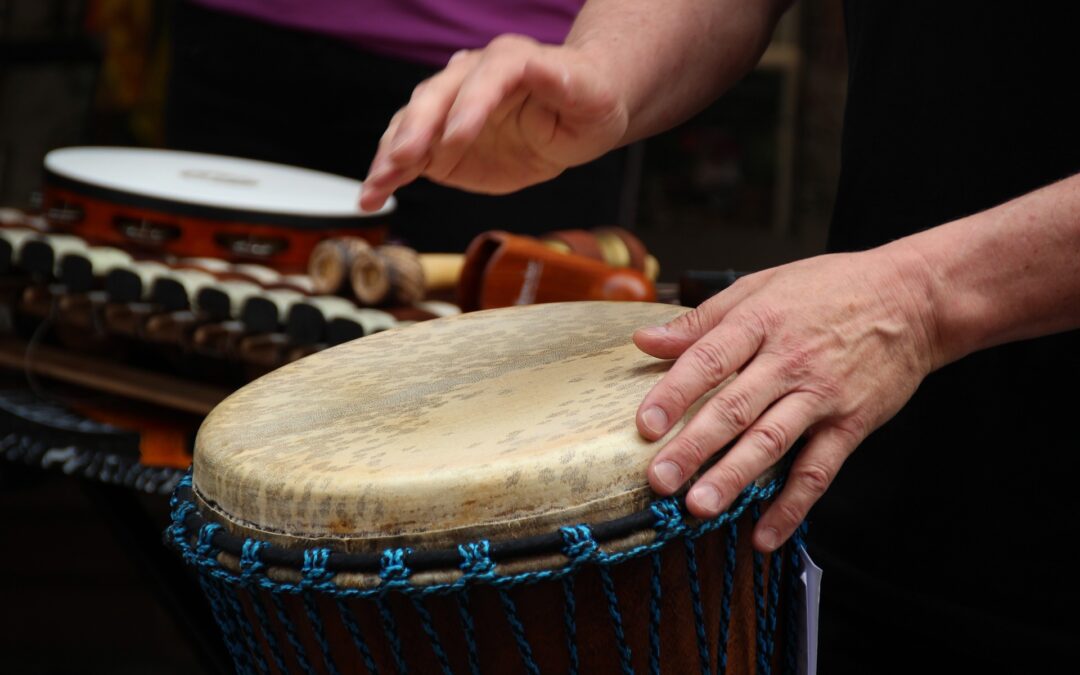Bang your drum… it could make you smarter and healthier!

I want to bang on the drum all day
I don’t want to play
I just want to bang on the drum all day
–Todd Rundgren
Twice in the last several months, the topic of drumming came up in our AnCan Men Speaking Freely group and it generated some excitement both times. So this month’s invite will be on that topic.In my former practice whenever I have given a non-verbal treatment there is a big relief that no talking is involved. In bypassing the verbal and left-brain systems we gain access to a typically unused part of ourselves. I wonder if we can use this approach to cope with our serious illnesses and have a better life?
Our brains have a characteristic called plasticity, the ability to change. You may have heard of this regarding the little finger brain circuit of violinists; it grows as they become proficient. Drummers also have different brains than the rest of us. They have fewer, thicker nerve fibers between the two halves of the brain. They have more efficiently organized motor cortices. (Schlaffke, 2019). Because of this, drummers can do things that we can’t. They can coordinate the two sides of the brain better, and perform motor tasks with greater efficiency. They can play different rhythms with each hand and foot at the same time.
Schlaffke’s subjects had drummed many hours per week for decades. But Bruchhage’s (2020) subjects trained for only 8 weeks and showed several changes in the cerebellum plus changes in the cortex, showing not only cerebellar plasticity but also communication and coordination between the cerebellum and brain sensorimotor areas as well as areas for cognitive control.
Drumming is very complicated, which is why it’s unfair that the lead guitar and vocal guy gets all the girls (Greenfield, J. 2022).
For some reason, there is a close association between beat synchronization (integrating auditory perception with motor activity) and reading ability in children (Bonacina, 2021). Higher synchronization ability predicts better literacy skills. Maybe early intervention involving drumming can improve literacy in kids?
Cahart et.al (2022) showed that drumming can improve behavioral outcomes for autistic adolescents and elucidated some of the neurology involved. Does this mean it could help us?
Drums have been used for millennia for healing, inducing trance, and even psyching up soldiers.
We have learned that drumming is not just about waking up the right brain, but also about connecting the sides of the brain, and the cerebellum with the cortex. It can induce alpha brain waves. It can release endorphins. Even T-cells respond to drumming (Bittman). It induces present-moment experience, which we often work toward to deal with death anxiety. Interpersonal connections are made when people drum together. Despite the effort involved, it induces relaxation. I have come across papers describing drumming and music therapy for a wide variety of emotional problems and currently, there are 8000 music therapists in the US.
How about for us? We see above the possibility of reductions in anxiety, tension, pain, isolation, depression, and over-thinking the past and future. There are many studies of music therapy in ICUs, with patients on ventilators, easing hemodialysis pain, with positive results. Also, helpful with narcotic use, social integration, and depression. MSKCC uses music therapy.
 With terminal cancer, there is data showing that music helps breathing, QOL, psychospiritual integration, reducing pain in chemotherapy, radiation, and helps pediatric breast and lung Ca patients (Ramirez 2018, Hilliard 2003, Burns 2015 Tuinmann 2017, Barrera 2002, Li 2011, Lin 2011). Atkinson (2020) found improvement with fatigue. I couldn’t find any studies focused only on Prostate Cancer.
With terminal cancer, there is data showing that music helps breathing, QOL, psychospiritual integration, reducing pain in chemotherapy, radiation, and helps pediatric breast and lung Ca patients (Ramirez 2018, Hilliard 2003, Burns 2015 Tuinmann 2017, Barrera 2002, Li 2011, Lin 2011). Atkinson (2020) found improvement with fatigue. I couldn’t find any studies focused only on Prostate Cancer.
Well, all this scholarly stuff is really unnecessary to anyone who ever banged a pot with a wooden spoon. Kids love it. Adults love situations where it’s OK to be wild and make noise, such as drumming circles and Pound classes. It’s just fun and feels good.

